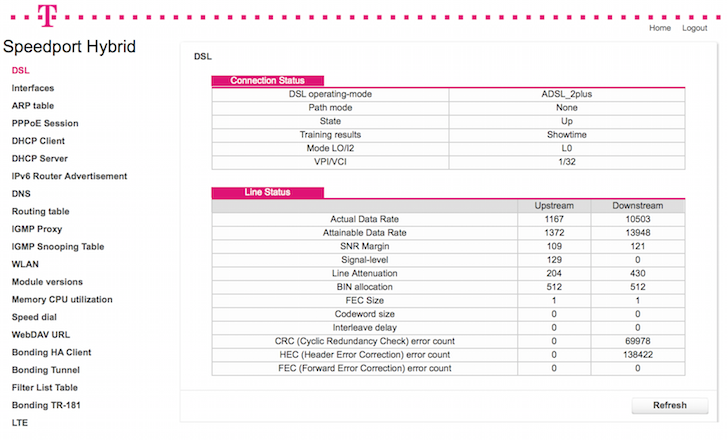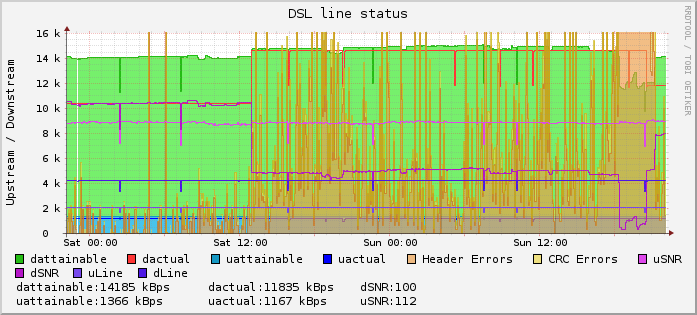You own a Telekom Speedport Router? The web-interface sucks? It forces you to login every fucking time? You want to draw fancy rrdtool-graphs from raw data?
This script helps you to access the status information that is available in the "hidden" Engineer-Menu, which is only available after you perform a login on the bloated web interface.
l33tport was written using node.js, so you need to have a working node installation. For the crypto-foo we're are using the Stanford Javascript Crypto Library, for commandline parsing commander is needed:
npm install sjcl
npm install commander
Adjust the address (Usually speedport.ip / 192.168.2.1) and the password in the header of the script.
Usage: speedport [options]
Options:
-h, --help output usage information
-V, --version output the version number
-o, --output <format> Output format (json, rrd)
-d, --dsNames <dsNames> rrdtool update format specifier
-f, --fieldname <fieldname> specifies the status field
You may use one of the following fieldnames (i.e. -f dsl):
- dsl DSL connection status and line information
- interfaces Network interfaces
- arp ARP table
- session PPPoE Session
- dhcp_client DHCP client
- dhcp_server DHCP server, includes DHCP leases
- ipv6 IPv6 Router Advertisement
- dns DNS server and cache information
- routing Routing table
- igmp_proxy IGMP Proxy
- igmp_snooping IGMP Snooping Table
- wlan WLAN status and information
- module Software version information
- memory Memory and CPU utilization
- speed Speed dial
- webdav WebDAV URL
- bonding_client Bonding HA client
- bonding_tunnel Bonding tunnel
- filterlist Filter list table
- bonding_tr181 Bonding TR-181
- lteinfo LTE information
- Status Systeminformation (no login needed)
- SecureStatus Secure system information (login needed)
- Overview General status information, i.e. tunnel status
- modules
- Abuse trusted SMTP servers configuration
- DECTStation DECT configuration
- hsdelmobil DECT handset status
- LAN LAN status (DHCP assigned IPs ect.)
Download dsl status file and print content in JSON format:
$ node ./l33tport.js -f dsl
The result will look like this:
{ Connection:
{ dsl_operaing_mode: 'ADSL_2plus',
path_mode: 'None',
state: 'Up',
training_results: 'Showtime',
mode_lo: 'L0',
vpi_vci: '1/32' },
Line:
{ uactual: '1167',
dactual: '13551',
uattainable: '1368',
dattainable: '13524',
uSNR: '109',
dSNR: '59',
uSignal: '130',
dSignal: '0',
uLine: '210',
dLine: '420',
uBIN: '512',
dBIN: '512',
uFEC_size: '1',
dFEC_size: '1',
uCodeword: '0',
dCodeword: '0',
uInterleave: '0',
dInterleave: '0',
uCRC: '4',
dCRC: '6901',
uHEC: '2',
dHEC: '30865',
uFEC: '0',
dFEC: '0' } }
l33tport 's output may be formatted to fit as input for 'rddtool update' command. The rrdtool data source names must be equal to names used in the JSON. Example for updating the dsl-Databae:
$ ./l33tport.js -f dsl -o rrd -d "uSNR,dSNR,uactual,dactual,uatainable,dattainable"
The output looks like this:
--template uSNR:dSNR:uactual:dactual:uatainable:dattainable N:1167:13551:13468:109:59
It may be fed directly into a rrdtool update call:
rrdtool update dsl.rrd $(./l33tport.js -f dsl -o rrd -d "uSNR,dSNR,uactual,dactual,uatainable,dattainable")
See the rrdtool directory for sample scripts.

